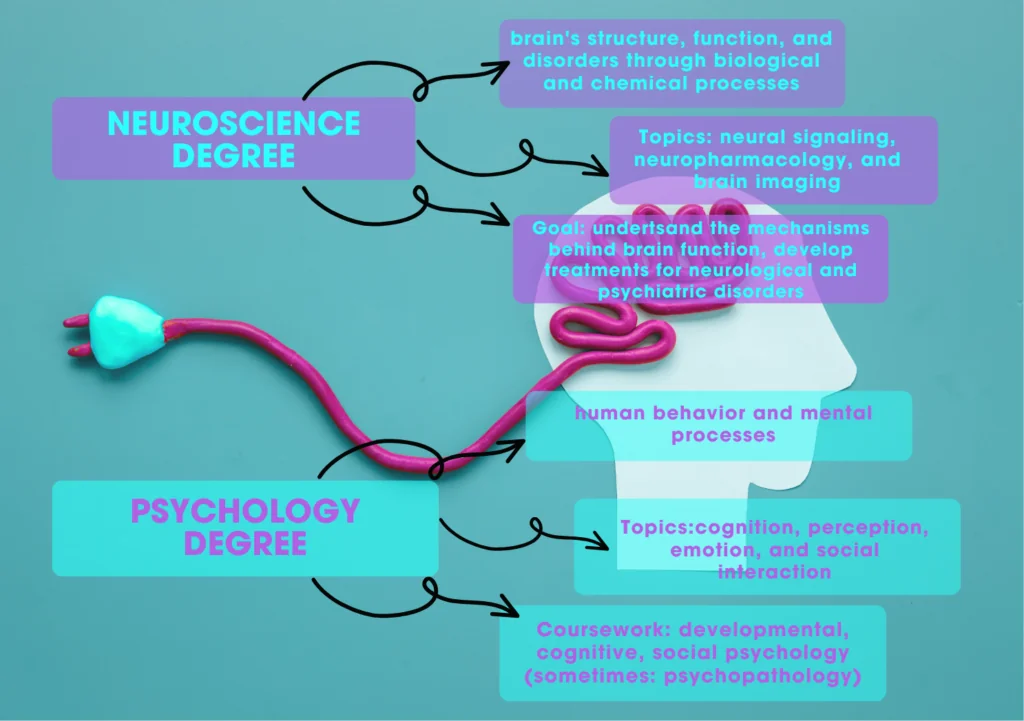Psychology is a rather old study, even though the field itself as we know it today started emerging only somewhere around 1830. However, the questions of how people think/work and why they do it that way have always been on the minds of the most prominent philosophers and ideologists. What not everyone knows though is that psychology is not the only study dedicated to human behavior and mind. Neuroscience is another scientific field that fairly has only recently started to grow and develop. Yet, it is still dedicated to the investigation of the human brain. Considering the similarity of primary objects of both these study fields, we can ask ourselves the natural question: what is the difference between neuroscience vs psychology? The short answer is that while neuroscience investigates the human mind through the lens of the structure and function of the nervous system, psychology tries to do the same using observations of behavior, cognition, perception, attention, and emotion. Now, let’s look a bit closer at each of these fields and find out whether there are any other major distinctions.

✅ AI Essay Writer ✅ AI Detector ✅ Plagchecker ✅ Paraphraser
✅ Summarizer ✅ Citation Generator
Neuroscience & Psychology: Definition, Study Objectives & Key Differences
If we dig into the core, we will see that neuroscience and psychology are both fascinating fields that explore different aspects of the human brain and behavior. However, they approach these topics from slightly different angles.
Neuroscience is the scientific study of the nervous system, particularly the brain. It focuses on the understanding of:
- how neurons communicate
- how sensory information is processed
- and how behavior and emotions are influenced by various brain structures and chemicals.
To answer all of those questions, neuroscientists use various research methods, such as brain imaging techniques (like MRI and PET scans), electrophysiology, and genetic analysis. They also draw upon knowledge from other fields, such as biology, chemistry, and physics. The primary objective of neuroscience is to understand how the brain and nervous system function as a cohesive organ system, including how neurons grow, organize, and function. This, in turn, means the exploration of how the brain’s nerve cells communicate and influence behavior, sensory perception, and emotions.

Psychology, on the other hand, is the scientific study of human behavior and mental processes. It covers a broad range of topics, including:
- cognitive functions
- emotions
- personality traits
- social interactions
- and abnormal behavior.
Similar to neuroscientists, psychologists also use a wide range of research methods, such as experiments, surveys, and case studies, to gather data and analyze behavior. However, in contrast to the previous field of study, a psychology BA degree is divided into numerous subfields, including clinical psychology, social psychology, and developmental psychology, each focusing on a specific aspect of human behavior and using different approaches to study it. In terms of the objective, psychology tries to understand human behavior by studying the mind. This involves exploring various mental processes and constructs, such as memory, recall, attention, language development, and emotional regulation. Different disciplines within psychology therefore focus on different psychological constructs to explain behavior and the human condition.
How Both Fields Work
Since in neuroscience the focus is on understanding the structure and function of the brain and nervous system, this scientific field uses specific methodology. We briefly mentioned it above but let’s look a bit closer at how everything works here.
The brain operates in rhythmic patterns known as brain waves, which influence how we think, act, and respond. Neuroscientists use techniques such as quantitative EEG assessments (qEEG) to analyze brain activity. This involves placing sensors on specific scalp locations to measure EEG activity in real time. The results are then compared against a database of other individuals, helping neuroscientists identify areas of the brain that are over- or under-stimulated. This information can guide neurofeedback therapy, which is focused on adjusting the brain waves to improve mental health and cognitive function. Neurofeedback has been found effective for conditions like ADHD, epilepsy, anxiety, PTSD, and depression.
Psychology, on the other hand, is rather focused on helping people with various behavioral and mental health issues, as well as life and relationship challenges. They use evidence-based treatments like psychotherapy to help people improve their lives. Psychologists often perform tests and assessments to diagnose conditions and understand how a person thinks, feels, and behaves. These evaluations can cover areas like intellectual skills, cognitive strengths and weaknesses, vocational preferences, and personality traits. Psychotherapy, also known as talk therapy, is a key treatment method in psychology, and it can take many forms, such as cognitive behavioral therapy (CBT), dialectical behavior therapy (DBT), and interpersonal therapy. All of these types of therapy can be conducted individually, as a couple, or as a family, and psychologists work with their clients to determine the best approach for their needs.
Comparing Degrees: Which Should You Study
If you are a student looking into the differences between Neuroscience vs Psychology, it is because you found yourself at a degree crossroad. You want to study something, so-called “mind related”, but which of these paths you should choose? Well, to decide, you should first look into the focus, coursework, and career options of each field.
A neuroscience degree allows you to learn more about the brain’s structure, function, and disorders, emphasizing biological and chemical processes. It’s heavily rooted in the hard sciences, including biology, chemistry, and physics. Your primary focus on the Neuroscience course will be to understand the brain at a cellular and molecular level. Neuroscience students engage with topics like neural signaling, neuropharmacology, and brain imaging. The ultimate goal is to learn about and undertsand the mechanisms behind brain function and develop treatments for neurological and psychiatric disorders.

In contrast, a psychology degree explores and discusses human behavior and mental processes, covering topics such as cognition, perception, emotion, and social interaction. Psychology students study theories and approaches that help explain human behavior, whether it’s understanding how we learn or exploring how stress affects our bodies and minds. The coursework includes areas like developmental psychology, social psychology, and cognitive psychology, and the field offers diverse career options in therapy, education, business, and beyond.
Despite their differences, both degrees involve the scientific investigation of the mind and behavior. However, while neuroscience emphasizes biological and physiological aspects, psychology focuses on mental and behavioral processes. In terms of methods, neuroscience often involves laboratory work and advanced scientific techniques, while psychology typically involves observation, surveys, and experimental studies. Hence, your choice of the degree program should align with your interests and career goals, whether you’re more intrigued by the biology of the brain or the intricacies of human behavior.
Summing Up
Let’s draw the line on the differences between neuroscience and psychology. Neuroscience primarily examines the biological and physiological aspects of the brain and nervous system. It explores the neural mechanisms’ underlying functions such as memory, emotion, and perception, often using methods like brain imaging and electrophysiology to map neural activity. In contrast, psychology emphasizes understanding mental processes and behavior from a broader perspective. Psychologists investigate phenomena such as cognition, personality, and social interactions, often through observational studies, experiments, and clinical interventions. Neuroscience is more focused on the biological roots of behavior, while psychology explores how mental functions and behaviors are shaped by various internal and external influences. The two fields, while distinct, often intersect, as understanding the biological basis of behavior can improve psychological insights and vice versa.
FAQ
Follow us on Reddit for more insights and updates.





Comments (0)
Welcome to A*Help comments!
We’re all about debate and discussion at A*Help.
We value the diverse opinions of users, so you may find points of view that you don’t agree with. And that’s cool. However, there are certain things we’re not OK with: attempts to manipulate our data in any way, for example, or the posting of discriminative, offensive, hateful, or disparaging material.